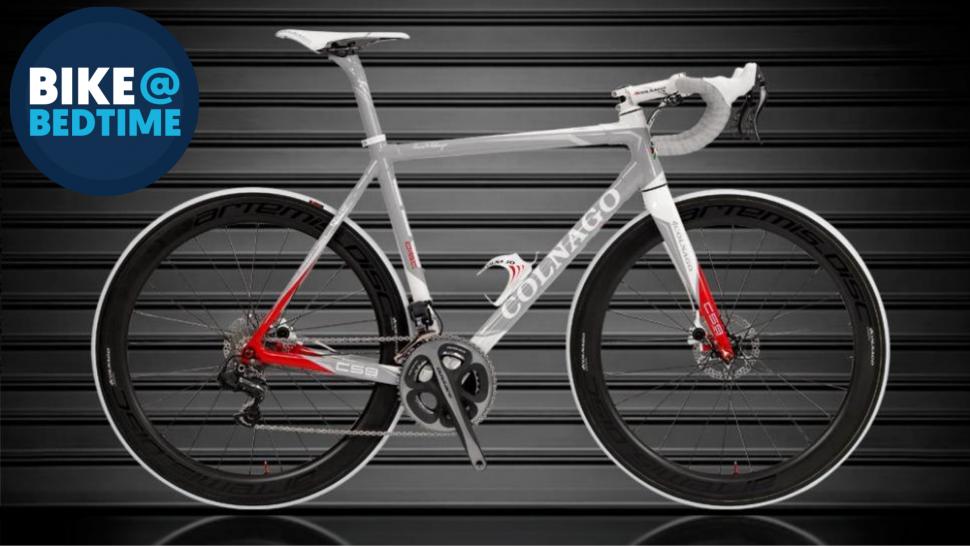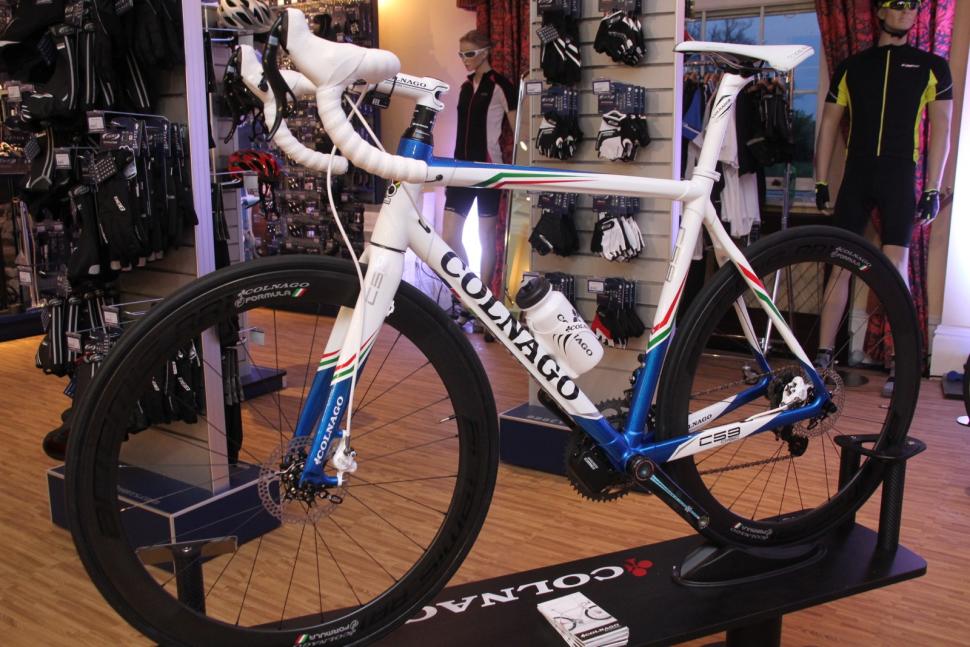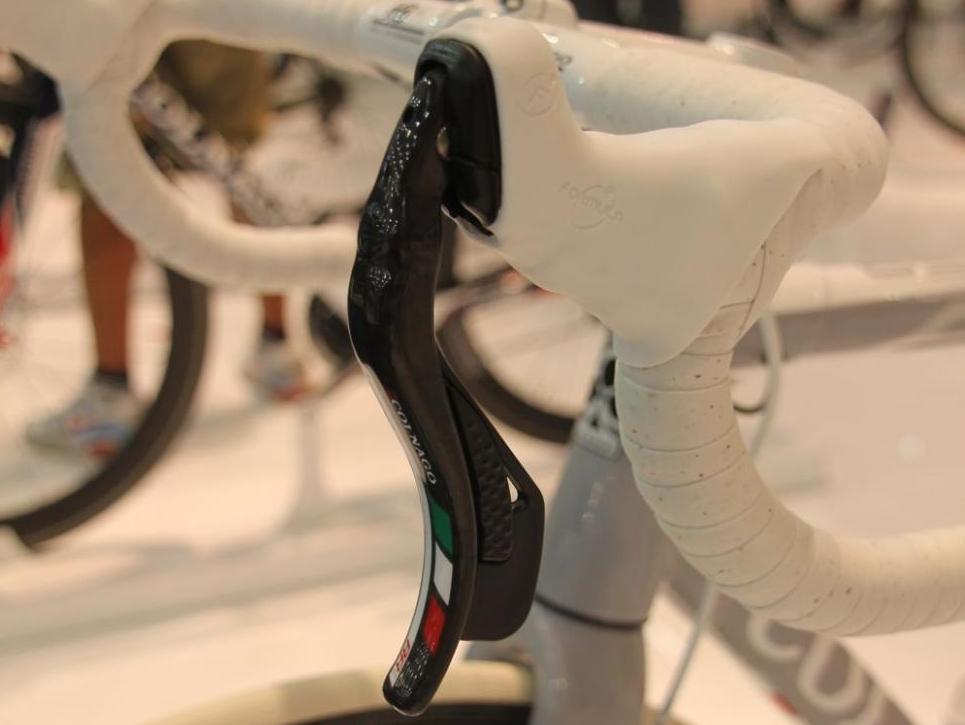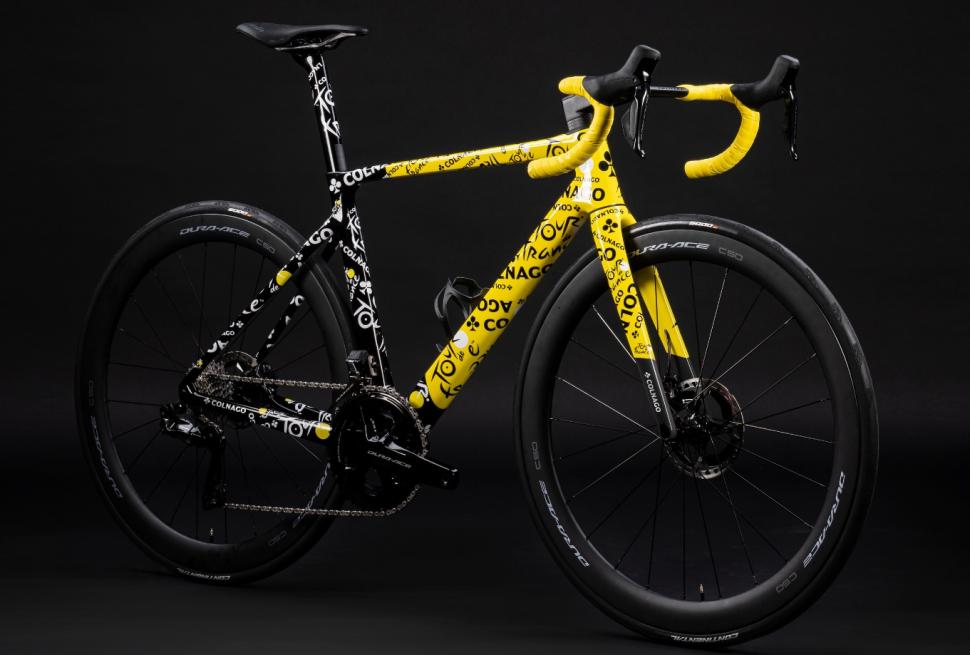- News
- Reviews
- Bikes
- Components
- Bar tape & grips
- Bottom brackets
- Brake & gear cables
- Brake & STI levers
- Brake pads & spares
- Brakes
- Cassettes & freewheels
- Chains
- Chainsets & chainrings
- Derailleurs - front
- Derailleurs - rear
- Forks
- Gear levers & shifters
- Groupsets
- Handlebars & extensions
- Headsets
- Hubs
- Inner tubes
- Pedals
- Quick releases & skewers
- Saddles
- Seatposts
- Stems
- Wheels
- Tyres
- Tubeless valves
- Accessories
- Accessories - misc
- Computer mounts
- Bags
- Bar ends
- Bike bags & cases
- Bottle cages
- Bottles
- Cameras
- Car racks
- Child seats
- Computers
- Glasses
- GPS units
- Helmets
- Lights - front
- Lights - rear
- Lights - sets
- Locks
- Mirrors
- Mudguards
- Racks
- Pumps & CO2 inflators
- Puncture kits
- Reflectives
- Smart watches
- Stands and racks
- Trailers
- Clothing
- Health, fitness and nutrition
- Tools and workshop
- Miscellaneous
- Buyers Guides
- Features
- Forum
- Recommends
- Podcast
feature
 Colnago C59 disc Bike at bedtime (credit: road.cc)
Colnago C59 disc Bike at bedtime (credit: road.cc)Check out the Colnago C59 Disc - the beginning of the end for rim brakes
Colnago has more heritage than most other brands could shake a stick at, but did you know that it was one of the first to bring hydraulic disc brakes to a performance-focused road bike back in 2012? Fast forward to today and hydraulic disc brakes are very much the norm on bikes of this kind, but the C59 Disc was in there right at the start.
It was at the 2012 Taipei Show that the Colnago C59 Disc burst onto the scene and, as with any radical new tech, it garnered plenty of attention. However, little did we know that we were staring at the future. Most people thought that disc brakes would eventually become common on road bikes, but how soon? And to what extent? We just didn't know.
The C59 Disc certainly wasn't the first road bike to feature disc brakes, but it was an important machine and represented the first card of many to be played by cycling's big brands.
Disc brakes were already huge in mountain biking, of course, and the UCI permitted disc brakes in cyclocross competition from 2010, but road cycling was slower to pick up the technology. The UCI first allowed disc brakes in road racing on a trial basis in 2015, and full authorisation wasn't granted until 2018.
Back in 2012, there was no such thing as a complete hydraulic disc brake groupset for road bikes. To overcome this, Colnago got together with fellow Italian brand Formula. These Colnago-branded hydraulic callipers were mounted to the frame using a post mount system rather than the flat mount standard that we most commonly see today.
The remainder of the drivetrain came in the form of Shimano Dura-Ace Di2 – R7900 generation – but with Formula levers adapted to house the brake's master cylinder. This hydraulic fluid took up all the space previously used for the mechanical shift workings.
It's not just the groupset that had to be altered, the C59 Disc frameset also saw some changes from the rim-brake version. The fork was completely redesigned to prevent unwanted wheel ejection, for example, and the frame featured beefed-up chainstays to help cope with the extra braking forces generated by the Formula disc brakes.
Colnago did a good job of strengthening the C59 Disc because it was the bike that featured in Martyn Ashton's famous 'Road Bike Party' video on YouTube. Check out his bike in the gallery above...
On the flip side, in our First Ride review at Eurobike 2012, Vechiojo described the C59 as “big boned”.
> Read our Colnago C59 Disc First Ride from 2012
He said, "Sadly, the Colnago C59 Disc isn’t quite the revelation or revolution it might be. It could be the future, just not quite yet…"
Top-level disc brake bikes, although still often heavier than their rim-brake counterparts, can usually meet the UCI's 6.8kg minimum weight limit for racing these days.
Colnago officially unveils V4Rs road bike with its ‘fastest monocoque frame ever’
Since 2012, Colnago has developed its disc brake bikes massively. There's the beautiful C68 Disc, for example, the superb V4Rs that Tadej Pogacar rode to victory in last year's Tour de France, and the recently-released Y1Rs aero road bike.
Check out our review of the Colnago V4Rs
Plus, everyone believes that a V5Rs launch is imminent, although we're still waiting for Colnago to reveal the details of that one.
These bikes owe a lot to the Colnago C59 Disc. Although it's just 13 years since Colnago introduced its first disc-brake road bike, rim brakes have almost (but not quite) disappeared from the range.
Do you think the Colnago C59 Disc is one of the most iconic bikes of the century so far? Let us know in the comments below...
Jamie has been riding bikes since a tender age but really caught the bug for racing and reviewing whilst studying towards a master's in Mechanical engineering at Swansea University. Having graduated, he decided he really quite liked working with bikes and is now a full-time addition to the road.cc team. When not writing about tech news or working on the Youtube channel, you can still find him racing local crits trying to cling on to his cat 2 licence...and missing every break going...
Latest Comments
- bobbinogs 3 sec ago
Yepp, fantastic coverage. It seems strange that WBD have forced me to spend less and get better coverage! Thing is, I would have been happy with a...
- David9694 47 min 40 sec ago
+1 on saddle height and also check your lateral alignment - everything should be straight and aligned. My bike fit years ago moved my feet to the...
- froze 51 min 52 sec ago
Everything Lezyne sells are really good, especially their pumps, and the Torque Drive. ...
- wtjs 1 hour 35 min ago
It's not only the UK which suffers from vile louts-VdP is a great athlete who deserves respect!
- Hirsute 2 hours 11 min ago
https://www.youtube.com/watch?v=wOzP87HVCWw
- Rendel Harris 3 hours 37 min ago
Apart from the fact that you're completely wrong - Decathlon is a French company and has 1045 stores in Europe compared to 50 in the UK - whilst...
- hawkinspeter 5 hours 43 min ago
Finally tried out the Smart Lever that I did get for Xmas as I had a suspicious looking bubble/bump on my rear GoodYear tyre (don't think I'll buy...
- chrisonabike 8 hours 46 min ago
Further motoring exemptions have been highlighted by a certain celebrity lawyer: needing the loo, being a well-known footballer...












Add new comment
4 comments
I remember this being released and thinking it was definitely the future. I built my own kludgy, much cheaper equivalent in 2013.
What I can't remember is whether this bike was ever offered for sale as a production model?
I did similar. I found a Mapei-finished C59 disc frameset online and proceeded to build what I hoped would be a fantastic Colnago. It turned out to be the last Colnago I would ever buy...
The frame was misaligned from new. Sent it back to Italy. They 'fixed' it after many months. Received it back and there were bunches of carbon fibre strands sticking out from where it had been 're-joined' on the insides. It was at least straight this time. I did ride it just to see what it was like. Compared to my Colnago EPS it felt awful. Sent it back again for a refund.
I think they may have sold the C59 disc as a complete bike. I remember bumping into someone one evening at Hillingdon crits who had one I think was exactly the same as the bike in the main pic of this article.
Scrolled down to check that Road Bike Party featured!
Bit sad about Martyn Ashton though, later on.